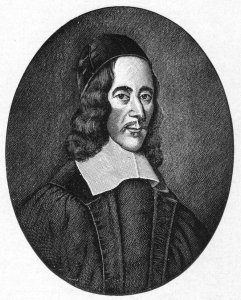
By all accounts, George Herbert was a cool guy. Our knowledge is limited because he lived long ago … more than 400 years ago. He only lived to the age of 39, but that was in the days before antibiotics and indoor plumbing.
I’ve chosen to write about this poetic champion because of how he expresses his art as a means of worship.
Born into a wealthy artistic family in Wales, he enrolled in Cambridge with the intention of becoming a priest. He seems to have gotten sidetracked by politics, became a supporter of King James, and served in Parliament.
But King James died, Herbert’s secular prospects dimmed, and he became an Anglican priest in his mid-30s. He was reportedly an attentive parish priest. He cared for his parishioners, looking out for the poor and ill. He was only to live a few more years before dying of tuberculosis.
When I recently asked my Anglican son for suggestions he suggested Herbert. Coincidentally, I already had him on my list. His poem The Quiddity has been one of my favorites for some time.
Quiddity is a Latin word for “the essence,” or “what the thing really is.” The poem is a poet writing about poetry. It starts out with a litany of things that a poem is isn’t.
But, at the end of the poem, Herbert gets to the point about what a poem really is. And for him, poetry is the thing that brings him close to God.
The Quiddity
by George HerbertMy God, a verse is not a crown,
No point of honour, or gay suit,
No hawk, or banquet, or renown,
Nor a good sword, nor yet a lute.It cannot vault, or dance, or play ;
It never was in France or Spain ;
Nor can it entertain the day
With a great stable or domain.It is no office, art, or news ;
Nor the Exchange, or busy Hall :
But it is that which, while I use,
I am with Thee : and Most take all.